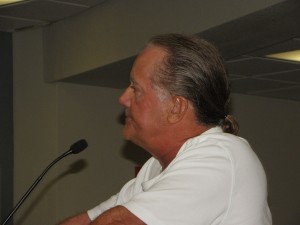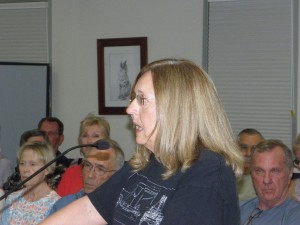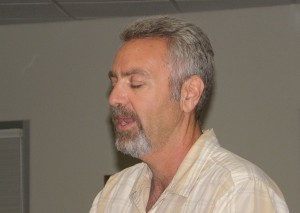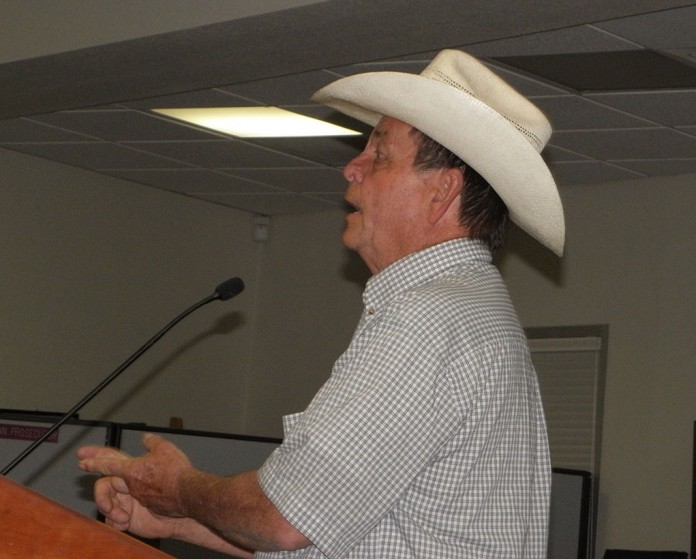Town Manager assembles rate study group
CAVE CREEK – As Monday’s council meeting came to order, Mayor Vincent Francia announced there would be a special council work session at 6 p.m. on Aug. 22 on water.
During Call to the Public, Kerry Smith first thanked council for their service.
Smith then raised an issue about information council receives from planning staff and said planners are analysts for the town, not advocates.
He said, “Too often they’ve acted as advocates.”
Smith said Landmark West Builders’ proposal for an apartment complex at Cave Creek Road and Galloway Drive needs to take traffic, water and sewer into consideration.
However, Smith said Ken Madden of Landmark said planning staff told him they didn’t think there were any issues with the proposed project.
Terry Smith came to the podium and said he was there like he’s been too many times before on behalf of the west side of town.
He said there have been three fires now in their neighborhood and they have numerous pictures of firefighters hooking up hoses to fire hydrants (not hooked up to a water line), wasting time while a house burned.
Smith said they were told they would have water by September.
However, a recent conversation with Mark Stapp of the Cahava Springs project, who hoped to raise funds through the sale of improvement district bonds, indicated the water line would not be completed as originally anticipated.
Smith said Cahava could turn the lines over to the town at any time but the town would not accept them until some improvements are made.
He said, “West side residents are the ugly step children of Cave Creek. We’re here to draw a line in the sand,” and gave the town an ultimatum that there be water in those lines by Sept. 30, 2016 or a lawsuit will be filed.
Smith said, “We have law firms chomping at the bit. If we don’t have water by Sept. 30, that’s the line we’re drawing in the sand.”
Twelve residents, so far, have signed up to be plaintiffs and, according to Smith, they expect to have 30.
Kathy Smith said in 2004 she started building four homes and had to pay impact fees for each.
She said the fire that happened on her road was on July 27 and noted she has to pay an additional $340 per year to Rural/Metro Fire for each of her houses.
Because his well has gone dry like many in the neighborhood, Gary Becker said he has to haul a lot of water and they were promised, Cahava or not, they would have water by September.
Becker said, “The lack of your concern is very disturbing,” adding, “We’re also pursuing individual lawsuits against each of you personally.”

Rick McDougal said the house behind him burned down about eight months ago and it “scared the hell out of me.”
He said he is afraid for his family.
Janet Becker asked council if they’ve ever turned on a water faucet and there was no water.
Becker said it has happened to her as she pleaded, “Please, please give us water.”
Tamara Smith said she agreed with everything being said.
Harrold Shell said he concurred with everything said but claimed, as a retired firefighter, a water tanker truck does not have enough water to put out a house fire.
He also claimed Rural/Metro’s mutual aid agreement with Daisy Mountain Fire isn’t true.
Frank Brennan said he lives next door to the house that burned down six months ago and stated, “We need to get that water line.”
John Miller, a west side resident for 16 years, said Cahava promised water and underground utilities but nothing has been done that’s been promised.
He said he has to haul water because he has horses.
Barbara Miller, a realtor, said, “You can’t sell property without water.”
She said some real estate sales have gone through based on the previous promises of water, which could now end up in lawsuits.
According to Miller, land values on the west side of town are half that of values on the east side, despite the land being “prettier.”
Dianne McDougal said this has been the third house to burn down in the 12 years since she’s lived there.
She said firefighters told them the house would burn down because there was not enough water to save it – only to contain it and put the embers out.
A teary Bobbie Darzes said it was her house that burned down and she lost everything, including her cat.
Darzes said neighbors gave her a place to live and clothes to wear.
She said, “Something has to change. I didn’t have anything. It’s scary.”
Jane Rhodes said she has horses and has to have water hauled in.

She said they were really excited last spring when they were told they would get water.
However, Rhodes was not an advocate of litigation and told council, “Maybe you guys will act … maybe the new council.”
J.D. Smith said he had to go out and buy a water truck because he hauls so much water.
Rural/Metro Fire Chief John Kraetz first looked at Darzes to tell her they did everything they could to try to save her home, which she acknowledged.
Kraetz said he wanted to clear up a few things that were said.
He stated fires come in different sizes and all the water in the world will not put out a fire if the house is fully involved.
Kraetz then addressed the mutual aide agreement with Daisy Mountain, which he said was “one mile in and one mile out.” He said if there was uncertainty over jurisdiction then they will call first.
After everyone was done speaking, Francia asked Town Clerk Carrie Dyrek to reschedule the water workshop and use the Aug. 22 time slot for this subject instead.
He asked Town Manager Peter Jankowski to contact Mark Stapp and advise him of the meeting.
Francia then said, “We will provide water and have Mr. Stapp pay us back.”
Tony Geiger, chair of the Water Advisory Committee, announced a rate study group had been formed to better understand where the town is financially and operationally as a utility to help develop a range of rate and policy options to help council direct the utility into the future.
The study group will be comprised of the town manager, finance manager and utilities manager along with four citizens, Geiger, Paul Eelkema, Bob Morris and Kerry Smith.
He said the first order of business for the group will be to develop a request for proposals (RFP) that will be advertised to hire a rate consultant.
However, Geiger stated it is critical that the study group do a significant amount of work on the front end of the process and said the rate study group will meet at least two times prior to the issuance of the RFP.
He said the meetings will be during the day and open to the public.

Geiger said additional group meetings will be scheduled to inform the public of milestones reached and when new information is available.
He said the process is designed give the town a detailed understanding of where it stands with its utilities from an operational and financial stand point and stated, “We will have benchmarked our utility to better understand how we stack up against other utilities in key metrics, including, but not limited to, O&M expenses, overhead and deferred maintenance.”





